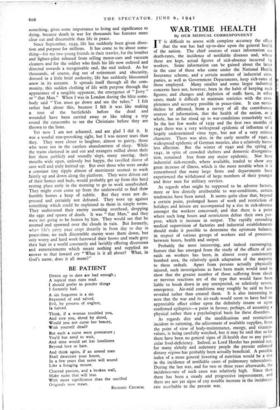WAR-TIME HEALTH
By OUR MEDICAL CORRESPONDENT
IT is difficult to assess with complete accuracy the effect that the war has had up-to-date upon the general health of the nation. The chief sources of exact information are death-rates, the incidence of notifiable diseases and, where these are kept, actual figures of sick-absence incurred by workers. Some information can be gained about the latter in the case of those who come under the National Health Insurance scheme, and a certain number of industrial com- panies, as well as Government Departments, keep sick-rates of those employed. Many smaller and some larger industrial concerns have not, however, been in the habit of keeping such figures; and changes arid depletion of staffs have, in other cases, made it difficult to maintain statistics with the com- pleteness and accuracy possible in peace-time. It can never- theless be affirmed, from a survey of all the contributory sources of information, that the health of the nation, as a whole, has so far stood up to war-conditions remarkably well. In the last few weeks of 1939 and the first two months of 1940 there was a very widespread epidemic of influenza of a largely undetermined virus type, but not of a very serious character. There was also, in the early months of 1940, a widespread epidemic of German measles, also a relatively harm- less affection. But the winter of 1940 and the spring of 1941, in spite of crowded shelters and domestic disorganisa- tion, remained free from any major epidemic. Nor have industrial sick-records, where available, tended to show any great increase of illness, which is the more notable when it is remembered that many large firms and departments have experienced the withdrawal of large numbers of their younger and fitter men for military services.
As regards what might be supposed to be adverse factors, more or less directly attributable to war-conditions, certain tendencies have been noted. It seems quite clear that, beyond a certain point, prolonged hours of work and restriction of holidays and leisure are accompanied by a rise in sick-absence amongst the workers concerned; and that there is a point where such long hours and restrictions defeat their own pur- pose, which is increase in output. The rapidly extending medical supervision of factories and industrial establishments should make it possible to determine the optimum balance, in respect of various groups of workers and of processes, between hours, health and output.
Probably the most interesting, and indeed encouraging, feature that has emerged from the study of the effects of air- raids on workers has been, in almost every consistently bombed area, the relatively quick adaptation of the majority to these ordeals. Apart from persons actually physically injured, such investigations as have been made would tend to show that the greater number of those suffering from shock or nervous reactions are of the type that would have been liable to break down in any unexpected, or relatively severe, emergency. Air-raid conditions may roughly be said to have revealed rather than created them. It is also interesting to note that the war and its air-raids would seem to have had no appreciable effect either upon the definitely insane or upon confirmed epileptics—a point in favour, perhaps, of assuming a physical rather than a psychological basis for these disorders.
As regards diet and the modifications and restrictions incident to rationing, the adjustment of available supplies, from the point of view of body-maintenance, energy, and vitamin- values, is being carefully watched, but it may be said that so far there have been no general signs of ill-health due to any parti- cular food-deficiency. Indeed, as Lord Horder has pointed out, for many elderly and sedentary people the present enforced dietary regime has probably been actually beneficial. A possible index of a more general lowering of nutrition would be a rise in the incidence of notifiable cases of pulmonary tuberculosis. During the last war, and for two or three years afterwards, the incidence-rate of such cases was relatively high. Since then there has been a steady and progressive improvement, and there are not yet signs of any notable increase in the incidence- rate ascribable to the present war.


























 Previous page
Previous page